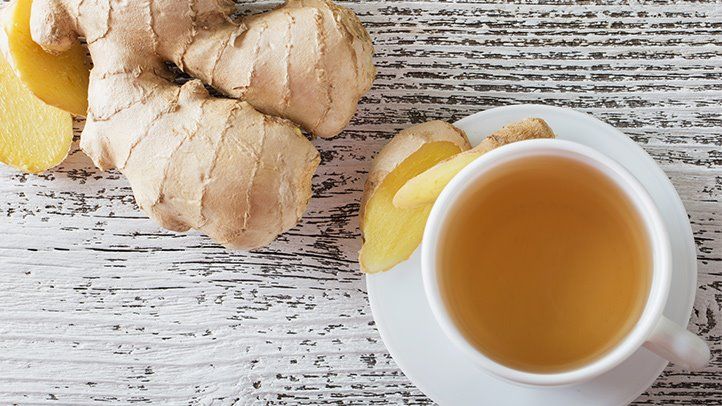What are the health benefits of ginger?

Ginger, renowned for its distinct flavor and medicinal properties, has been cherished for centuries in various cultures for its multitude of health benefits. From alleviating digestive discomfort to reducing inflammation and supporting immune function, this humble root offers a treasure trove of wellness-promoting properties. In this comprehensive exploration, we delve into the myriad ways in which ginger can enhance health and well-being, shedding light on its remarkable therapeutic potential.
1. Digestive Aid: One of the most well-known and widely studied health benefits of ginger is its ability to aid digestion. Ginger contains compounds such as gingerol and shogaol, which have been shown to stimulate the production of digestive enzymes and improve gastric motility. Consuming ginger can help alleviate symptoms of indigestion, bloating, and nausea, making it a valuable ally for those with digestive issues or discomfort.
2. Anti-inflammatory Properties: Ginger possesses potent anti-inflammatory properties that can help reduce inflammation throughout the body. Chronic inflammation is linked to various health conditions, including arthritis, heart disease, and certain types of cancer. By incorporating ginger into the diet, either through fresh ginger root, ginger tea, or supplements, individuals may experience relief from inflammation and associated symptoms, promoting overall health and well-being.
3. Pain Relief: In addition to its anti-inflammatory effects, ginger is also valued for its analgesic properties, which can help alleviate pain and discomfort. Studies have shown that ginger may be effective in reducing muscle pain, menstrual cramps, and osteoarthritis-related joint pain. Whether consumed orally or applied topically in the form of ginger oil or poultices, ginger offers a natural and safe alternative to conventional pain-relief medications.
4. Immune Support: Ginger is rich in antioxidants, vitamins, and minerals that support immune function and help the body fend off infections and illness. Its antimicrobial properties can help combat harmful pathogens, while its immune-boosting effects may help reduce the risk of respiratory infections such as the common cold or flu. Incorporating ginger into the diet can help strengthen the body’s defenses and promote overall immune health.
5. Cardiovascular Health: Emerging research suggests that ginger may have beneficial effects on cardiovascular health. Studies have shown that ginger may help lower blood pressure, reduce cholesterol levels, and improve blood sugar control, all of which are important factors in maintaining heart health. By including ginger in a heart-healthy diet, individuals may reduce their risk of cardiovascular disease and improve their overall cardiovascular health.
6. Cognitive Function: Ginger contains compounds that have been shown to support brain health and cognitive function. Research indicates that ginger may help protect against age-related decline in cognitive function and may have potential therapeutic effects in neurological disorders such as Alzheimer’s disease and Parkinson’s disease. By including ginger in the diet, individuals may support brain health and promote cognitive vitality as they age.
7. Weight Management: Some studies suggest that ginger may aid in weight management by increasing metabolism, reducing appetite, and enhancing fat burning. Additionally, ginger’s ability to improve digestion and regulate blood sugar levels may contribute to its potential role in supporting weight loss efforts. While more research is needed to fully understand ginger’s effects on weight management, incorporating it into a healthy diet and lifestyle may offer additional support for those seeking to achieve or maintain a healthy weight.
8. Anti-nausea Effects: Ginger has long been used as a remedy for nausea and vomiting, particularly in cases of motion sickness, pregnancy-related morning sickness, or chemotherapy-induced nausea. Its anti-nausea effects are attributed to its ability to modulate neurotransmitter activity in the brain and soothe the digestive system. Consuming ginger tea or ginger supplements may provide relief from nausea and help improve overall quality of life for individuals experiencing gastrointestinal discomfort.
9. Antioxidant Power: Ginger is packed with powerful antioxidants that help protect cells from damage caused by free radicals, unstable molecules that can contribute to oxidative stress and chronic disease. These antioxidants, including gingerol, zingerone, and shogaol, scavenge free radicals and help neutralize their harmful effects, reducing the risk of oxidative damage and supporting overall health and longevity.
10. Anti-cancer Potential: Preliminary research suggests that ginger may have potential anti-cancer properties, with studies showing promising results in inhibiting the growth and spread of cancer cells. Ginger’s antioxidant and anti-inflammatory effects, along with its ability to modulate gene expression and induce apoptosis (programmed cell death), may contribute to its anti-cancer potential. While more research is needed to fully understand ginger’s role in cancer prevention and treatment, incorporating it into a balanced diet may offer additional support for overall health and well-being.
11. Respiratory Health: Ginger’s anti-inflammatory and antimicrobial properties extend to the respiratory system, making it a valuable ally in maintaining respiratory health. Ginger may help alleviate symptoms of respiratory conditions such as asthma, bronchitis, and allergies by reducing inflammation in the airways and promoting the clearance of mucus. Additionally, ginger’s warming properties can help soothe sore throats and provide relief from coughing, making it a natural remedy for respiratory discomfort.
12. Gastrointestinal Relief: Beyond aiding digestion, ginger is also valued for its ability to provide relief from gastrointestinal issues such as gas, bloating, and constipation. Ginger promotes the movement of food through the digestive tract, helping to alleviate symptoms of gastrointestinal discomfort and improve overall gut health. Whether consumed as a tea, in capsules, or incorporated into meals, ginger can help soothe an upset stomach and promote digestive wellness.
13. Anti-diabetic Effects: Studies suggest that ginger may have beneficial effects on blood sugar levels and insulin sensitivity, making it potentially beneficial for individuals with diabetes or at risk of developing the condition. Ginger’s ability to enhance insulin secretion and improve glucose uptake in cells may help regulate blood sugar levels and reduce the risk of complications associated with diabetes. Incorporating ginger into the diet may offer additional support for managing blood sugar levels and promoting metabolic health.
14. Skin Health: Ginger’s antioxidant and anti-inflammatory properties extend to the skin, making it a valuable ingredient in skincare products and home remedies. Ginger may help reduce inflammation, soothe irritation, and promote collagen production, contributing to healthier, more radiant skin. Whether applied topically as a mask or incorporated into skincare products, ginger can help address a variety of skin concerns, from acne and blemishes to signs of aging and uneven skin tone.
15. Stress Reduction: Ginger’s calming and soothing properties make it an excellent remedy for reducing stress and promoting relaxation. Ginger contains compounds that help modulate neurotransmitter activity in the brain, promoting feelings of calmness and well-being. Whether consumed as a tea or used in aromatherapy, ginger can help alleviate stress and tension, allowing individuals to unwind and rejuvenate both mentally and physically.
16. Hair Health: Ginger’s antioxidant and anti-inflammatory properties extend to the scalp and hair follicles, making it beneficial for promoting healthy hair growth and reducing scalp conditions such as dandruff and itching. Ginger stimulates blood circulation to the scalp, nourishing hair follicles and promoting stronger, healthier hair growth. Whether used in hair masks, shampoos, or scalp treatments, ginger can help improve the overall health and appearance of hair, leaving it shiny, smooth, and lustrous.
17. Bone Health: Emerging research suggests that ginger may have beneficial effects on bone health, particularly in reducing the risk of osteoporosis and improving bone density. Ginger contains compounds that help stimulate bone-building cells and inhibit the activity of bone-resorbing cells, leading to stronger, healthier bones. By incorporating ginger into the diet, individuals may support bone health and reduce the risk of fractures and osteoporosis-related complications as they age.
18. Enhancing Nutrient Absorption: Ginger’s digestive-enhancing properties extend to its ability to improve nutrient absorption in the body. By stimulating the secretion of digestive enzymes and promoting gastric motility, ginger helps break down food more efficiently and facilitates the absorption of essential nutrients such as vitamins, minerals, and antioxidants. Incorporating ginger into meals or consuming ginger tea before or after meals can help optimize nutrient absorption and promote overall health and vitality.
19. Menstrual Relief: Ginger has long been used as a natural remedy for menstrual cramps and discomfort. Its anti-inflammatory and analgesic properties help alleviate pain and reduce inflammation associated with menstruation, providing relief from cramps, bloating, and other menstrual symptoms. Whether consumed as a tea or taken in supplement form, ginger can help soothe menstrual discomfort and improve overall menstrual health.
20. Anti-aging Benefits: Ginger’s antioxidant-rich profile makes it a potent ally in combating the effects of aging on the body and skin. By scavenging free radicals and reducing oxidative stress, ginger helps protect cells from damage and prevent premature aging. Regular consumption of ginger may help promote youthful vitality, improve skin elasticity, and reduce the appearance of fine lines and wrinkles, contributing to a more youthful and radiant complexion. Incorporating ginger into the diet and skincare routine can help support overall anti-aging efforts and promote long-term health and well-being.
In conclusion, ginger’s remarkable health benefits make it a valuable addition to any diet. From aiding digestion and reducing inflammation to supporting immune function and promoting cardiovascular health, ginger offers a multitude of therapeutic properties that can enhance overall health and well-being. Whether consumed fresh, as a tea, in supplements, or as a culinary spice, incorporating ginger into your daily routine can help you reap its myriad rewards and live a healthier, more vibrant life.
FAQ:
- How does ginger aid digestion? Ginger contains compounds such as gingerol and shogaol that stimulate the production of digestive enzymes and improve gastric motility, helping to alleviate symptoms of indigestion, bloating, and nausea.
- Is ginger effective for reducing inflammation? Yes, ginger possesses potent anti-inflammatory properties attributed to its active compounds, which can help reduce inflammation throughout the body and alleviate symptoms of conditions like arthritis and heart disease.
- Can ginger help with pain relief? Studies have shown that ginger has analgesic properties and can help alleviate pain from conditions such as muscle soreness, menstrual cramps, and osteoarthritis-related joint pain.
- How does ginger support immune function? Ginger is rich in antioxidants, vitamins, and minerals that support immune function and help the body fend off infections and illness, making it a valuable ally for maintaining overall health and wellness.
- Does ginger have cardiovascular benefits? Emerging research suggests that ginger may help lower blood pressure, reduce cholesterol levels, and improve blood sugar control, all of which are important factors in maintaining heart health and reducing the risk of cardiovascular disease.
- Can ginger support cognitive function? Some studies indicate that ginger may have beneficial effects on brain health and cognitive function, protecting against age-related decline and potentially offering therapeutic benefits in neurological disorders such as Alzheimer’s disease and Parkinson’s disease.
- Is ginger beneficial for weight management? Research suggests that ginger may aid in weight management by increasing metabolism, reducing appetite, and enhancing fat burning, although more studies are needed to fully understand its effects on weight loss.
- Can ginger help with nausea and vomiting? Ginger has long been used as a remedy for nausea and vomiting, particularly in cases of motion sickness, pregnancy-related morning sickness, or chemotherapy-induced nausea.
- What are the antioxidant properties of ginger? Ginger is packed with powerful antioxidants that help protect cells from damage caused by free radicals, reducing the risk of oxidative stress and chronic disease.
- Is ginger safe for everyone to consume? While ginger is generally considered safe for most people when consumed in moderate amounts, it may interact with certain medications or exacerbate certain health conditions. It’s always advisable to consult with a healthcare professional before adding ginger supplements to your routine, especially if you have underlying health concerns or are taking medications.
Related Posts
What does ginger do to the body?
-
Posted by
akshita aishwarya
- 0 comments



